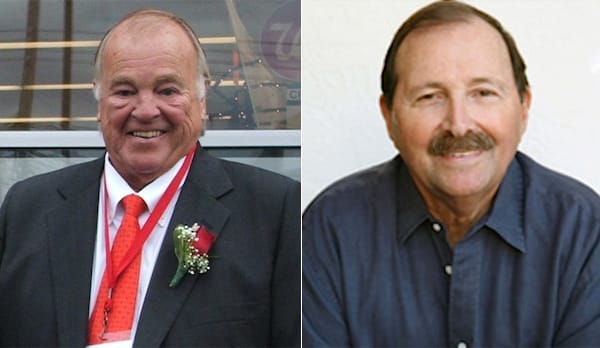The ranks of the chain drug industry’s giants continue to shrink — and, typically of a business that continues to grow, prosper and change, the tendency is to forget to remember what these icons accomplished.
Last month, two executives who were instrumental in building chain drug retailing passed away.

Charles “Cork” Walgreen III (left) and David Bloom
They were radically different, yet remarkably similar. One preferred the background; the other enjoyed the limelight. Each either guided his company to a level not previously achieved or returned it to its former prominence. One of the two did both.
Cork Walgreen assumed control of the drug chain founded by his grandfather during the most challenging period in its history. Once the definition of a drug chain, Walgreens had seen other, newer retailers pass it by. Once the industry leader in sales, Walgreens was, by the 1970s, no more than a middling performer. Once a retailer that represented all that was unique, and exceptional, in a drug chain, the Chicago-based company had diversified into discount stores and restaurants; had begun operating in Mexico; and had started franchising its name and its own-brand products — with indifferent results.
Cork Walgreen, meanwhile, had had equally indifferent results as a businessman. Indeed, despite his name and family connections, he was not immediately thought of when succession plans at Walgreens were discussed. Yet he was given the assignment of righting the drug chain when other options failed to do the job.

Without calling up his resume, two aspects of his tenure as head of Walgreens stand out: his ability to choose capable executives and his acute understanding that Walgreens’ business was the drug store business.
So it was that he selected strong executives to run the company, then gave them the latitude to do their jobs. So it was as well that he made the decision to sell off Walgreens’ ancillary businesses and return the company to its drug store roots.
Along the way, he led the company in upgrading its store base — withdrawing from some markets and strengthening others — opening new stores and remodeling older ones; bringing technology to a retailer that had operated without it; abandoning the retailer’s antiquated headquarters in Chicago for new, more modern offices in the northern suburb of Deerfield; and generally refreshing and reengaging a retailer that had allowed time and inactivity to translate into a dangerous level of me-too-ism.
When Walgreen withdrew from the business, his grandfather’s creation had returned to its place as the No. 1 drug chain in the United States. And its former chief executive, always uncomfortable in the spotlight, chose to remain in the background until his death, last month, at age 80.
For David Bloom, much of the story was the same. The background and circumstances were different — Shoppers Drug Mart was a Canadian drug chain built on the franchising concept by Murray Koffler, a Canadian who had achieved success in a different business.
Bloom joined the company initially as a franchisee. When he was tapped to head the drug chain, Canada’s largest and most successful, his challenges differed somewhat from Cork Walgreen’s. He was asked to galvanize the retailer, which was actually owned by its members, while remaining in the background, something the outgoing and engaging Bloom found difficult to accomplish.
Nonetheless, he managed to inject new life into the drug chain, discarding old ideas and operational methods and bringing into the organization new people, new programs and a new aggressiveness. As well, he became a force within the National Association of Chain Drug Stores, the U.S. organization that effectively represented and supported the drug store business in America.
When Bloom walked away from Shoppers Drug Mart’s executive suite, the Toronto-based retailer had solidified its position as Canada’s leading drug chain and moved into the United States, quickly becoming a retailer of force and status within this country.
When Bloom passed away last month at age 76, Shoppers remained one of the truly significant drug chains in the Western Hemisphere.







